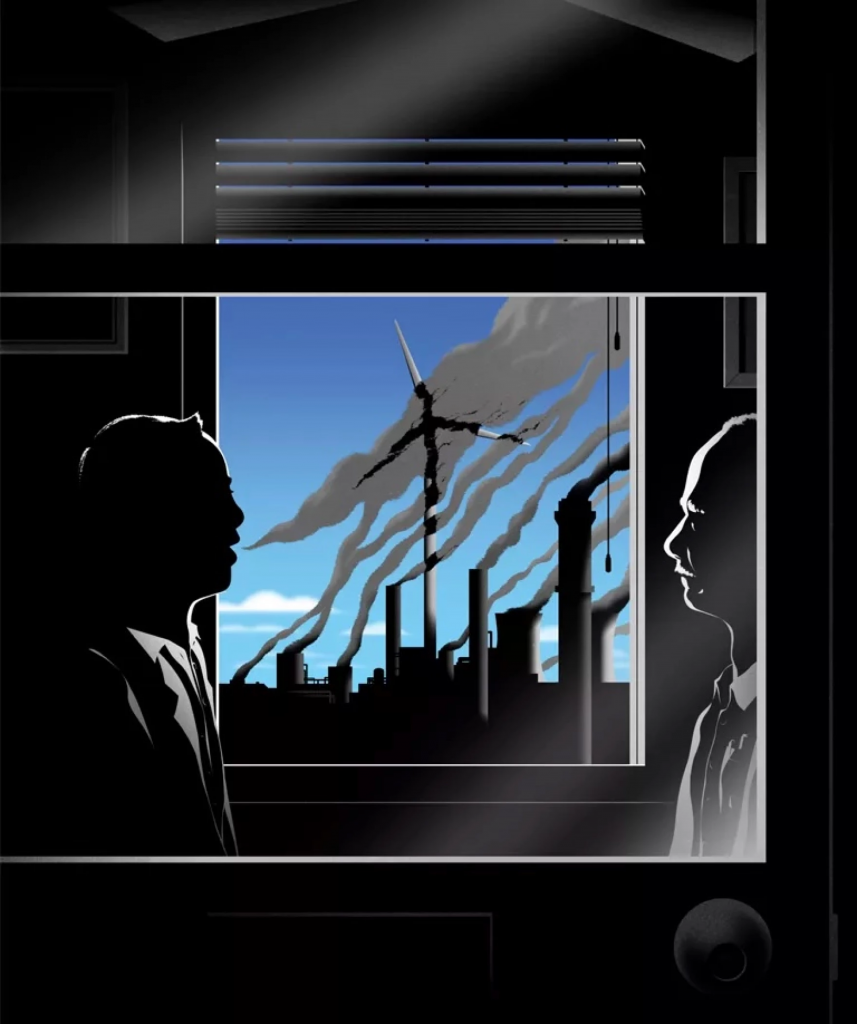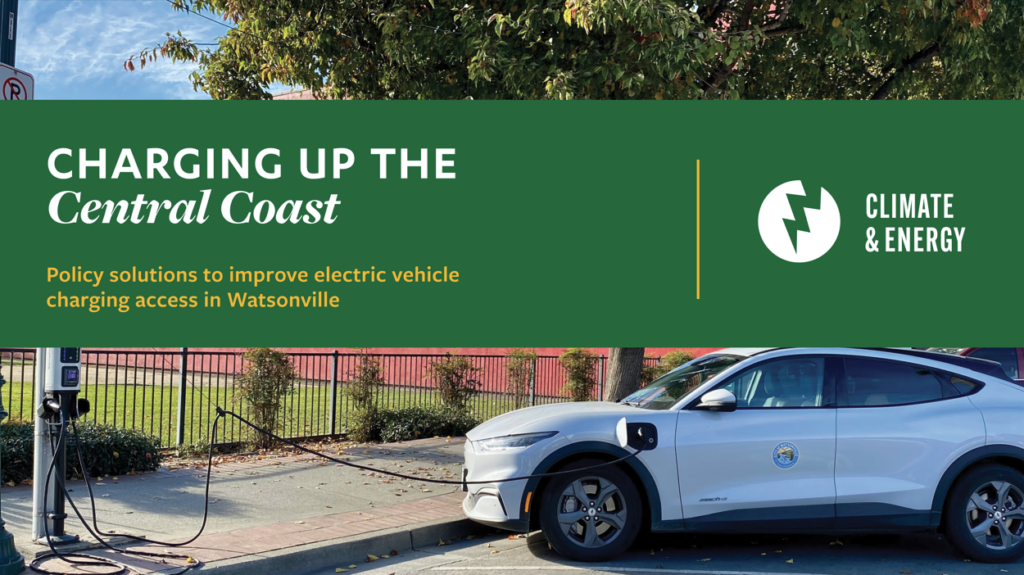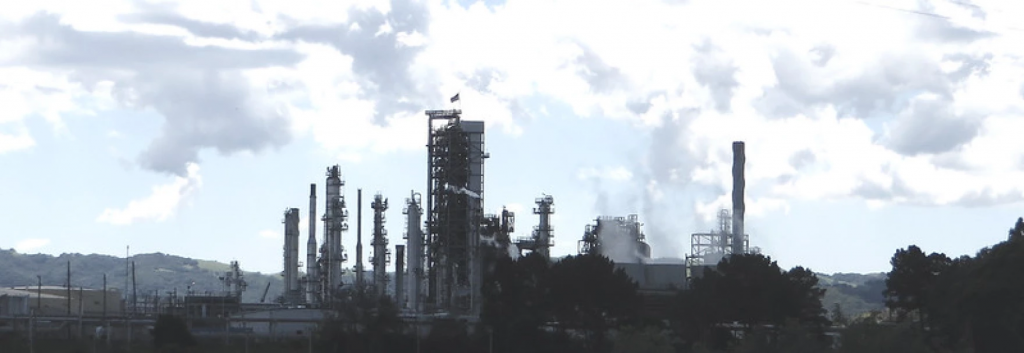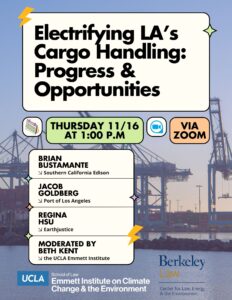
I’m guest hosting Your Call’s Media Roundtable this morning at 10am PT. First, we’ll discuss the coordinated campaign by fossil fuel interests and their allies to sow disinformation about renewable energy. I’ll interview Rebecca Burns, an award-winning investigative reporter who has covered this story extensively.
Then, we’ll discuss the one-year anniversary of the civil war raging in Sudan. Joining me will be Sudanese-American journalist Isma’il Kushkush, who has reported on the conflict from the beginning.
Tune in at 91.7 FM in the San Francisco Bay Area or stream live at 10am PT. What comments or questions do you have for our guests? Call 866-798-TALK to join the conversation!

On tonight’s State of the Bay, I’ll talk with Joe Eskenazi, Managing Editor of Mission Local, about the results of the March 5th Election and what they mean for San Francisco.
Then, I’ll interview three experts about whether climate disclosure and emissions requirements will be effective and what the prospects are for divestment from fossil fuels. The panel will include:
- Dave Jones, Director of the Climate Risk Initiative at UC Berkeley’s Center for Law, Energy and the Environment (CLEE)
- Rev. Kirsten Snow Spalding, Vice President of the Ceres Investor Network
- Malin Clark, Partner at Third Economy, a sustainability consulting firm
Finally, we’ll hear about the all-girl robotics team, The Janksters, and their robot Rosa! Joining me will be their coach, Marta Carrillo.
Tune in at 91.7 FM in the San Francisco Bay Area or stream live at 6pm PT. What comments or questions do you have for our guests? Call 866-798-TALK to join the conversation!

I’ll be a guest on KQED Forum at 10am PT today discussing how to improve electric vehicle charging infrastructure in California.
Electrical vehicle purchases in the state dropped significantly in the second half of last year, for the first time in a decade. It’s likely this is just a blip, but some potential EV buyers say that they’re holding off because of concerns over public charger access and reliability.
The situation may be improving though: California approved a $1.9 billion dollar investment in EV charging infrastructure last month, which will bring 40,000 new chargers online – including in rural areas.
On the show, I’ll talk about what California needs to do to meaningfully expand its EV charging infrastructure ahead of its 2035 ban on the sale of new gas-powered cars. Joining me on the panel will be:
- Russ Mitchell, Automotive Editor, Los Angeles Times, who covers the automotive industry.
- Terry Travis, managing partner, EVNoire, a Mobility Consulting Group that works to integrate and amplify diversity, equity, and inclusion in the electric transportation sector.
Tune in on KQED 88.5 FM in the San Francisco Bay Area or stream live at 10am PT!
California’s ambitious goal to end the sale of internal combustion engine passenger vehicles by 2035 will require addressing the challenges faced by lower- and moderate-income drivers in accessing battery-powered electric vehicles (EVs). Chief among these concerns is their need to have a convenient and affordable place to charge the vehicles.
Currently these residents too often experience limited access to EV charging stations, especially in lower-income communities characterized by lower home ownership rates and higher rates of tenancy in apartment buildings. Residents in these areas are more likely to lack dedicated parking spaces equipped with electric outlets, hindering their ability to charge EVs conveniently. Even those with garages or parking spaces may face financial constraints when it comes to investing in private charging and electrical upgrades. Compounding these challenges is the often-inadequate grid infrastructure in lower-income areas.
In response to these obstacles, UC Berkeley School of Law’s Center for Law, Energy & the Environment (CLEE) partnered with the City of Watsonville, a diverse city of 50,000 in Santa Cruz County’s agricultural heartland. Due to its location, demographics, and ambitious policy goals, Watsonville represents a potential model and case study for other cities around the state grappling with how to boost zero-emission vehicle charging infrastructure.
Today CLEE is pleased to release a new report, which draws on stakeholder interviews and a convening held in Watsonville to offer a set of policy recommendations for both state and local leaders. These recommendations aim to accelerate investment in EV charging infrastructure not only in Watsonville but other cities facing similar challenges in meeting state targets while addressing lower-income residents’ needs.

- Comprehensive Mapping Assessment: Watsonville’s City Planning Department and Public Works & Utilities Department could initiate a comprehensive mapping assessment to determine optimal and equitable charger locations based on local needs and transportation patterns.
- Zoning and Permitting Policies: Watsonville’s City Planning Department could revise zoning and permitting policies to require EV charger installation or EV-ready electrical infrastructure at certain priority locations.
- Electricity Rate Optimization: The CPUC and utility companies could implement electricity rates that reduce the cost of charging during off-peak hours and improve transparency for consumers about these rates.
- Community Awareness Campaigns: The state transportation agencies could expand support for community based organizations in Watsonville that conduct targeted, multi-lingual public awareness campaigns about the potential cost savings and benefits from switching to EVs.
By prioritizing charging access, state and local leaders can ensure that California’s path toward equitable EV deployment is not only aspirational but also achievable, particularly for the lowest-income drivers in the state. The lessons learned from Watsonville can serve as an example for other cities grappling with similar challenges, ultimately contributing to a more inclusive and sustainable transportation landscape.
Read our full report here- Charging up the Central Coast: Policy solutions to improve electric vehicle charging access in Watsonville

I’ll be a guest on KQED Forum this morning at 10am discussing lawsuits against the oil industry and its deceptive practices related to climate change.
Most recently, 18 California children sued the EPA for failing to protect them from climate change. The lawsuit is one of many efforts to hold the fossil fuel industry to account that reporter Dharna Noor highlighted in her series for the Guardian US called “Big Oil Uncovered.” We’ll discuss the strategies oil and gas companies are using to delay or avoid action on climate change — and the people and policies who are taking them to task.
Tune in on KQED in Northern California or stream live at 10am PT!

On tonight’s State of the Bay, we’ll discuss California’s role at the just-concluded United Nations Climate Conference (COP 28) and dig into what the agreement to begin reducing global consumption of fossil fuels might mean for Bay Area refineries. Plus, we’ll take a tour through the WPA murals of Coit Tower.
First, we’ll talk with Assemblymember Rebecca Bauer-Kahan, representing California’s 16th Assembly District in the East Bay, about the role of California and the Bay Area in this year’s COP.
Then, we’ll look at how the agreement reached at COP 28 to begin reducing global consumption of fossil fuels might mean for Bay Area refineries. Joining us will be:
- Ann Alexander, senior attorney with the Natural Resources Defense Council
- Greg Karras, independent consultant, senior scientist for Communities for a Better Environment and author of “Decommissioning California Refineries: Climate and Health Paths in an Oil State.”
Finally, we’ll take a tour through the WPA murals at San Francisco’s Coit Tower with Charlie Goldman.
Tune in at 91.7 FM in the San Francisco Bay Area or stream live at 6pm PT. What comments or questions do you have for our guests? Call 866-798-TALK to join the conversation!

The Ports of Los Angeles and Long Beach are major polluters in the region but also potential models for climate action — if they can electrify their equipment, from fork lifts to cranes. A new report released by UCLA Law’s Emmett Institute on Climate Change and the Environment and UC Berkeley Law’s Center for Law, Energy & the Environment (CLEE) —A Heavy Lift: Policy Solutions to Accelerate Deployment of Zero-Emission Cargo Handling Equipment at the Ports of Long Beach and Los Angeles and Beyond—surveys the biggest obstacles to speedy electrification and makes some recommendations.
Greenhouse gas emissions at the Ports come from three main sources: ships, heavy-duty vehicles, and cargo handling equipment (“CHE”). Cargo handling equipment is the third largest source of emissions accounting for approximately 14 percent of the Ports’ total greenhouse gas emissions. The Ports have replaced some fossil-fuel powered equipment with zero-emission models as they work toward goals set forth in their Clean Air Action Plan, including a goal to transition to 100 percent zero-emission CHE by 2030. However, more work is needed to fully transition the Ports large CHE fleet to zero-emission models. While some consider cargo handling equipment the “low hanging fruit” of port emissions reductions, there remain challenges for the transition to zero emissions. Some of the needed ZE technology is still being developed, and communities and workers have raised concerns around the potential for job loss.
To address these concerns, the law schools hosted a convening of experts from a variety of industries, including environmental, public health, environmental justice, labor, business, and government sectors. We discussed the challenges and opportunities of decarbonizing cargo handling equipment at the Ports. The report discusses the top barriers to transitioning to electric CHE models and proposes solutions to overcome these barriers.
The report dives into the following barriers:
- Inadequate grid and charging infrastructure to support zero-emission cargo handling equipment and lack of substantial planning and funding to install necessary and timely infrastructure.
- Evolving zero-emission technology for some types of cargo handling equipment and high upfront costs.
- Fear among communities and workers of job loss and of increased emissions from expanded port activities.
The report then recommends several solutions, including:
- The Ports and utilities, chiefly Southern California Edison and Los Angeles Department of Water and Power, could proactively deploy “no regret” infrastructure, including increasing grid capacity and upgrading distribution networks that will be needed regardless of how zero-emission cargo handling equipment is powered.
- The California Legislature; the Air Resources Board; and/or the South Coast Air Quality Management District, using their existing authority grounded in air pollution control, could create technology-forcing mandates and clear, enforceable implementation deadlines, with penalties for non-compliance, to catalyze the zero-emission cargo handling equipment transition. Where technology is not readily commercially available, regulations could incorporate adequate flexibility and sufficient lead time for entities to meet the mandate.
- State and local government could implement policies to promote job preservation, local job creation, and worker training, such as programs that encourage ports and terminal operators to partner with local training organizations to upskill and reskill the workforce to use the new vehicles and technologies.

Given the importance of the Ports to worldwide commerce, they could help inform climate action at ports around the globe, if they and policy makers can collaborate to achieve these zero-emission goals.
If you want to dive into this topic further, join us for a webinar discussion today, Thursday, November 16th at 1pm PT when we’ll discuss solutions with panelists from Southern California Edison, the Port of Los Angeles, and Earthjustice (RSVP here).
This report is ultimately part of a series on business solutions to address climate change. Read more: A Heavy Lift: Policy Solutions to Accelerate Deployment of Zero-Emission Cargo Handling Equipment at the Ports of Long Beach and Los Angeles and Beyond.
This post was co-authored by Beth Kent and Gabi Rosenfeld.

We need electric vehicles to fight climate change, and that means a lot of mining for minerals like lithium and graphite for the batteries. It’s better if that mining happens in the US rather than overseas, where worker and environmental protections may be weaker. But we still need to improve mining processes here.
My new op-ed in The Hill has recommendations on how to do so, following the release of a new federal interagency report on mining. The report calls for permitting agencies to conduct better upfront planning to ensure new mining activity is not sited in sensitive areas that would likely produce conflict, litigation and delay. To do this, I argue:
Specifically, the country can take its cue from California, where a public-private partnership among state government, academic institutions and nonprofits pioneered a stakeholder-led process to map lands for large-scale solar development in key regions in the state. That process resulted in the identification of hundreds of thousands of “least conflict” acres, which participants as diverse as Tribes, ranchers, endangered species advocates and developers agreed would be feasible to develop without harming communities or important resources. This approach is now being replicated in other states.
If we can pull this process off in this country, the result would be fewer conflicts, a more sustainable supply chain for EV batteries, and economic and environmental wins for the communities surrounding mines, including many tribal and rural communities. And maybe it could provide a model for other jurisdictions to follow suit, as the world undergoes a dramatic and badly needed transformation in its vehicle fleet to EVs.

On today’s Your Call One Planet Series, I’ll be guest hosting and talking to University of Pennsylvania renowned climate scientist Dr. Michael Mann, presidential distinguished professor in the Department of Earth and Environmental Science and director of the Penn Center for Science, Sustainability, and the Media.
He will discuss his new book, Our Fragile Moment: How Lessons from Earth’s Past Can Help Us Survive the Climate Crisis. In this sweeping work of science and history, Mann shows us the conditions on Earth that allowed humans not only to exist but to thrive, and how they are imperiled if we veer off course.
Then we’ll discuss Water for Life, a documentary film that tells the story of three Indigenous activists in Central and South America, fighting to protect their ancestral lands and water rights.
The film follows Alberto Curamil, a Mapuche chief in Chile; Francisco Pineda, a corn-grower in El Salvador; and the late Berta Cáceres, of the Lenca in Honduras, as they face jail and murder while leading movements to safeguard their drinking water and irrigation water from multinational corporations and corrupt governments. Joining us will be:
- Will Parrinello, award-winning documentary filmmaker and the director of Water for Life
- Sarah Kass, award-winning storyteller specializing in long- and short-form documentaries and non-fiction television, and producer of Water for Life
Tune in at 91.7 FM in the San Francisco Bay Area or stream live at 10am PT. What comments or questions do you have for our guests? Call 866-798-TALK to join the conversation!

On today’s Your Call, I’ll guest host a discussion of the health hazards of wildfire smoke. Last week, the San Francisco Bay Area experienced its first taste of this year’s fire season with the Air Quality Index numbers soaring into a range deemed unhealthy for the general population.
According to the National Oceanic and Atmospheric Administration (NOAA), wildfires are bigger, more severe, and more common today in the western United States than at any time in the last four decades. The recent fires in Maui that destroyed 80 percent of the seaside town of Lahaina are just the most recent tragic example. In California, nearly half of the state’s largest fires on record occurred in the past five years.
But immediate destruction from wildfires is only part of the picture. Wildfire smoke can have lasting impacts on human health. A new study from Lancet Planet Health found that smoke from the world’s worsening wildfires is now killing 33,510 people every year. It not only exacerbates respiratory illnesses like asthma, but is also linked to increased risk of cancer, heart attacks, and preterm birth.
So what can we do to keep ourselves safe as wildfires rage on? Joining me will be:
- Quinn Redwoods, founder and director of Mask Oakland
- Julie Johnson, journalist, staff writer at San Francisco Chronicle’s climate and environment desk
- Dr. Neeta Thakur, associate professor of pulmonary and critical medicine at UCSF, medical director of the outpatient pulmonary clinic at San Francisco General Hospital, co-director of the Partnerships for Research in Implementation Science for Equity (PRISE) Center.
- Dr. Sheri Weiser, internist and professor of medicine in the HIV, Infectious Diseases and Global Medicine division at UCSF, co-founding director of the University of California Center on Climate Change, Health and Equity
Tune in at 91.7 FM in the San Francisco Bay Area or stream live at 10am PT. What comments or questions do you have for our guests? Call 866-798-TALK to join the conversation!


